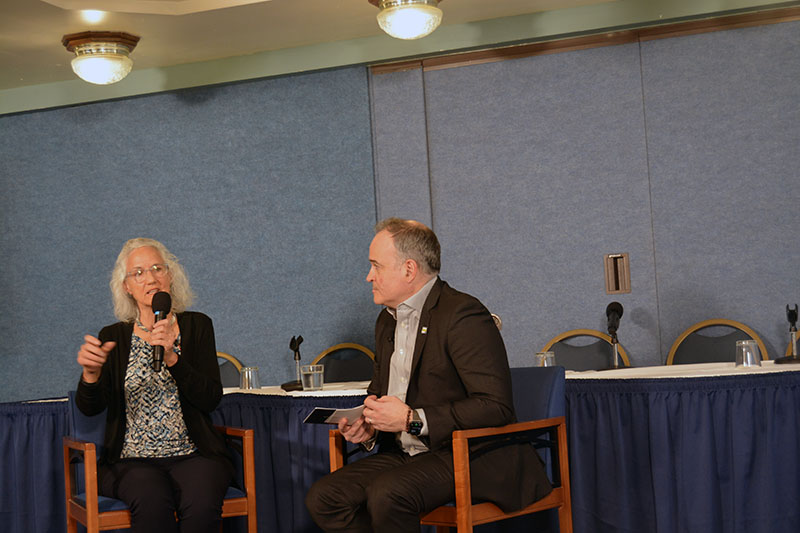U.S. knew of Austin Tice's location for years, his mom tells Club at Press Freedom Center event
A bombshell revelation by Debra Tice, mother of Austin Tice, the only American journalist detained abroad, at a luncheon May 1 kicked off two days of events at the National Press Club sounding the alarm on the U.S. government’s role in the rapid decline of press freedom at home and abroad.
In an interview at the luncheon with Matt Murray, executive editor of the Washington Post, Tice said that classified files to which she has been granted access by the government indicate that the U.S. concealed knowledge of her son’s exact whereabouts for over 12 years.

“We were always told we [the federal government] didn’t know where Austin was,” Tice said. “Finding so much truth after so much untruth was exceedingly painful. I don’t know if I ever will recover from that.”
In the chaos following the overthrow of ousted former president Bashar al-Assad in Syria, where Austin Tice was abducted in 2012, the search for the journalist has started at ground zero.
The luncheon that featured Debra Tice’s remarks launched the two-day slate of events, featuring eight panel discussion, staged by the Press Freedom Center at the Club in anticipation of World Press Freedom Day May 3.
Two panel discussions following the luncheon focused on the imminent threat to independent media in the U.S. and abroad resulting from the Trump administration’s selective ban on news outlets from White House events, and the shuttering of the United States Agency for Global Media (USAGM).
In a chilling statement, Press Freedom Center Executive Director Bill McCarren said that while the Center’s events typically discuss the problems of journalists in authoritarian countries overseas, “[t]oday's panel is different. It's about U.S. challenges and the growing problems that we are facing.”
Club President Mike Balsamo added, “This is without question one of the most urgent conversations we can be having now. We talk often about threats to press freedom abroad and we should, but we can't lose sight of what's happening here at home.”

Associated Press (AP) Washington Bureau Chief Anna Johnson addressed the White House’s ban on AP access to the press pool and other events because the news agency would not change its stylebook to rename the Gulf of Mexico: “This is about freedom of speech,” she said, “and the U.S. government should not retaliate against journalists or anyone in this country for the language that they use,” she said.
Paul Beckett, former assistant editor and Washington bureau chief of the Wall Street Journal, voiced concern about whether under pressure from the White House, media institutions will fragment and fold under pressure, as some law firms and universities have. “Those who concede will continue to concede, those who stand up and say no will be challenged, but they know they’re doing the right thing,” he said.
Beckett said he doesn’t know a senior editor or publisher of an American news outlet who doesn't think that the assault on press freedom isn't going to become a lot worse in the coming months.
In a second panel, participants said the Trump administration’s recent gutting of the U.S. Agency for Global Affairs not only has left reporters imprisoned abroad in limbo, but also put reporters currently in the U.S. in grave danger if forced to return to their countries of origin
"[I]n some cases they would be arrested upon arrival,” said Tamara Bralo, director of journalist safety at Radio Free Asia.
Meanwhile, authoritarian regimes are filling the gap with propagandist media. “They think this is one of the best things that’s ever happened,” said Andres Ilves, director of strategic initiatives at Middle East Broadcasting Networks, speaking of Houthi-sponsored television, Hamas-sponsored television, Hezbollah-sponsored television and Iranian state media.
Because of the lack of credible government information, Radio Free Europe leaves its 47 million weekly listeners across the globe “in the dark -- exactly the dark that the authoritarian regimes want them to live in,” said Alsu Kurmasheva, a Russian-American journalist for Radio Free Europe/Radio Liberty.
